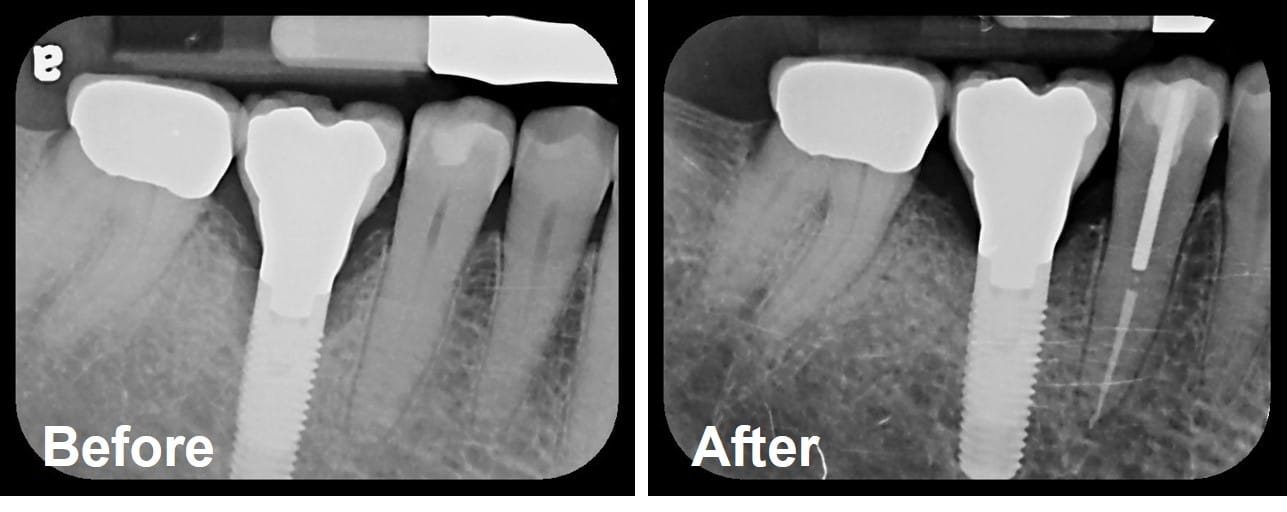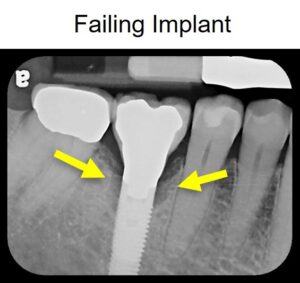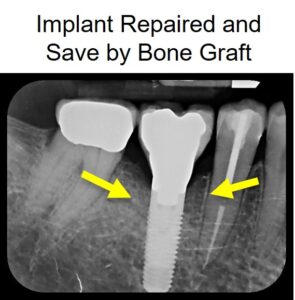Blog - Washington, DC
Tips, Facts, And The
Latest In Dentistry

Can a Failing Dental Implant Be Saved or Repaired?
Posted in Dental Implants
Posted on May 1, 2023 by Dr. Gerald Marlin

Dental implants are an excellent investment in your smile that can mimic the appearance, function, and durability of your natural teeth. It is no surprise that dental implants have become a popular tooth replacement option, leading many people to seek dental implants and implant-supported prostheses for their  smile.
smile.
However, not every dental implant lasts (please see our previous blog, “Common Factors That Can Limit the Success of Dental Implants”). There are many reasons a patient may have an implant that is failing. A failing dental implant may cause pain, gum recession, difficulty chewing, or swelling around the restoration.
Can a failing dental implant be saved or repaired? We will help you understand your treatment options for a failing dental implant, below.
The Bone Supporting the Implant May Need to Be Repaired
If you have a dental implant that is failing due to bone loss, gum disease, or had insufficient bone support in the first place, it is possible to  save the implant in most cases.
save the implant in most cases.
A bone graft can help restore the supportive tissue around the implant to save the restoration [1]. While you may not need to have your dental implant removed for a bone graft, in some cases, the implant will need to be replaced with a new one following bone augmentation.
By augmenting the bone around the implant, Dr. Marlin and Dr. Talmazov can save your implant to ensure a secure and beautiful restoration.
You May Need Treatment for Gum Disease
Periodontal disease, also called gum disease, can cause inflammation and infection around a dental implant (called peri-mucositis) as well as bone loss (called peri-implantitis) that can cause the implant to fail [2].
If you have gum disease that is causing a failing implant, treatment is necessary to help repair the implant site. In severe cases, the implant may need to be removed and replaced. However, mild to moderate cases of periodontal disease may only need minimal intervention in order to restore the health of the implant. In most instances, Dr. Marlin and Dr. Talmazov at Elite Prosthetic Dentistry can remove the abutment and crown, decontaminate the implant, and repair the implant with a bone graft.
Having your teeth professionally cleaned every six months and maintaining good oral health at home can help prevent gum disease and keep your implant healthy.
The Dental Implant May Need to Be Repositioned
If your dental implant was not properly placed to begin with, the implant may eventually fail. Improper placement can result in aesthetic and functional complications that can make a successful implant outcome impossible without correcting the placement issue [3].
Dental implants that fail due to improper positioning can typically be saved. Dr. Marlin and Dr. Talmazov meticulously plan your dental implant rehabilitation on a CBCT (3D image) prior to implant placement followed by Precision Implant Planning (PIP), which allows them to prevent this from happening and consistently achieve a successful outcome.
Precision-placed implants have a higher success rate, which is what allows Elite Prosthetic Dentistry to have a dental implant success rate higher than the national average.
If Your Implant Has Not Healed Properly
The healing stage for your initial implant placement is crucial to the success and longevity of your restoration. While proper placement is paramount, it’s equally important that you take good care of your smile after the implant placement process.
An implant may not heal properly due to improper placement, putting too much pressure on the teeth too soon (as is commonly seen in patients with bruxism), and not having enough bone to initially support the implant [4].
No matter why your dental implant is failing, we can help you address the root cause of your implant failure and discuss treatment options.
Is Your Dental Implant Failing?
If you are concerned that your dental implant is failing or are seeing signs of implant failure, don’t wait to speak to an experienced prosthodontist about your smile restoration. Contact Elite Prosthetic Dentistry today to schedule a consultation with Dr. Marlin and Dr. Talmazov to discuss your smile rehabilitation.
Sources:

Through this commitment, Dr. Marlin provides his patients with long-lasting (35 years vs. the national average of 7-10 years) aesthetic restorations so that they have virtually no future problems.
As such, he is a leading specialist in dental implants, cosmetic dentistry, sedation dentistry , and restorative dentistry in the Bethesda–Chevy Chase, Northern Virginia, and Washington DC Metro Area. He has inserted and restored over 3,600 dental implants.





